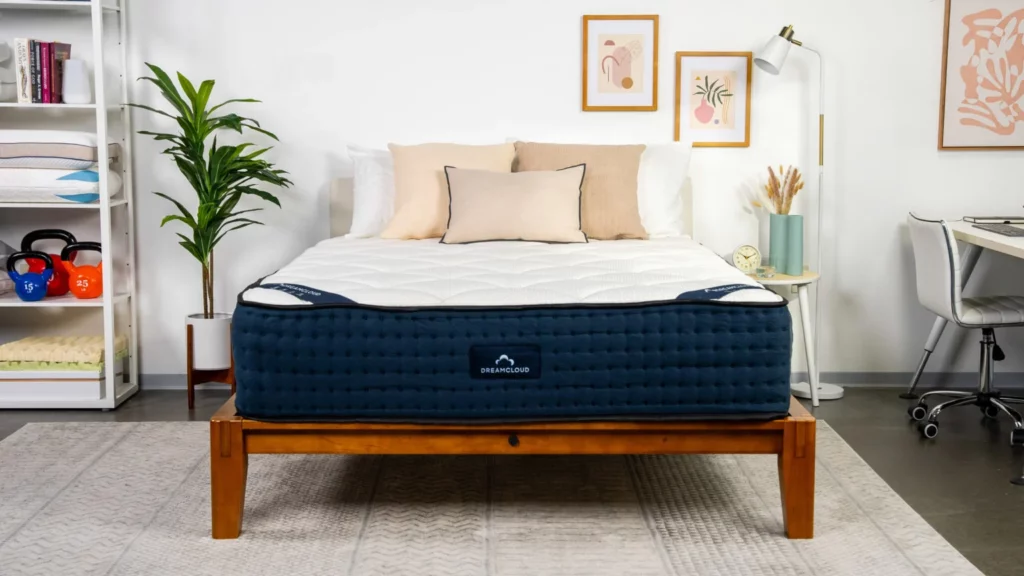If your nights are restless, you might blame it on your loud neighbors, your snoring spouse, your afternoon coffee, or your nightcap at dinner. While all of this may be possible, the real culprit for your lack of sleep could be literally in full sight (or under your back, for that matter).

If you are unsure whether your mattress affects your sleep quality or whether your snoring partner is the cause, there are several signs to watch for. Some of these signs can be seen by simply examining your mattress, while others can only be felt.
Read this article to discover more information about the warning signs of an inadequate mattress. If you see one or more of these signs, it’s probably time to replace them with a new one that will give you a good night’s sleep.
1. You Feel Tired When You Wake Up
Despite having slept for eight hours, you feel like you had no sleep in the morning. Does this situation sound familiar to you? Unfortunately, this widespread phenomenon is different from how we want to approach the upcoming morning.
“Whether you slept for 8 hours or 18, it makes no difference. If you sleep on a crappy mattress, your body probably isn’t getting the restorative sleep it requires to awake refreshed and eager to tackle the day.” – Dr. Robert Oexman, sleeping expert and head of the Sleep to Live Institute.
Other sleep disorders can be at the root of poor sleep quality. Take a look at this list of bad sleep habits before you blame your mattress:1
- Nutrition – Eating some kinds of food (usually rich, fatty, copious, or spicy) may result in an upset stomach, too much flatulence, and digestive problems, affecting your sleeping at night.
- Exercise – Physical activity, or the absence of it, affects your bedtime cycle. A moderate amount of exercise makes it easier to rest at night. At the same time, an intense workout before bed could cause you to be overly stimulated, leading to the opposite.
- Pre-sleep habits – Besides exercise, many overstimulating activities should be avoided before going to bed: excessive exposure to blue light, having coffee too late during the day, drinking at night, etc.
Many sleep disorders also cause inadequate quality and must not be left out either. But if neither of these conditions appears to be involved, it’s time to examine your mattress.
“Wriggling, tossing and turning, and fidgeting all night can indicate a quest by your body for a comfy resting position without achieving it. If you can’t find comfortable, supportive corners, you should probably replace your mattress.” – Dr. James Maas, author and sleeping specialist.
2. You Have Trouble Falling Asleep
You’ve tried every method of falling asleep and even tried to reduce the amount of time you spend in front of a screen an hour before heading to bed. But even though you try hard, sleep is slow to come.
“Regardless of the number of breathing exercises you put yourself through, if your bed mattress doesn’t support your back alignment or provide the firmness your body needs, sleep can turn into an almost impossible task.” – Dr. David Beaulieu, a chiropractor working for Beaulieu Chiropractor LLC.
A person usually sleeps in bed after 10 to 20 minutes.2 If it takes you more than an hour to fall asleep, you should check out your mattress and use a few sleeping tricks to get to sleep.
3. You End Up With a Runny Nose
If you have itchy eyes, sneezing or constant blowing of your nose, it may not come from an allergen in the air like pollen. In fact, it may be due to dust mites, an allergen you bunk with night after night.
“These unwanted microscopic organisms love to take refuge in warm, moist places like couches and beds, and are the source of skin rashes, itchy throats and runny noses.” – Dr. Sujay Kansagra, author and sleep expert.
4. You’ve Been Using Your Mattress For More Than 10 Years
Some mattresses indeed stand the test of time better than others. The question is: what is the lifespan of a bed? Most are built to provide a minimum of 10 years of durability, but some may lose their quality after seven years.
“Using mattress pads is a simple and effective method of boosting the longevity of your mattress, but if you haven’t changed it in decades, it’s time to replace it with a higher support mattress. ” – Dr. Neil Kline, sleeping expert and American Sleep Association delegate.
To ensure your bed lasts over time, take the following measures:
- Wash your bedding regularly
- Apply a mattress cover or protector
- Turn over your mattress quarterly
- Restrict your pet’s lazy time on your mattress
- Provide adequate support to your mattress with a suitable bed frame or box spring (it’s crucial if you struggle to figure out a way to keep the mattress from shifting).
5. You Suffer from Soreness and Back Pain
Can you have body aches because of a mattress? Sure you can! If you are getting up regularly with tension in your neck and spine, you do not necessarily have obvious signs of old age, but your bed probably is. Over the years of regular use, your bed can slowly become less structured, firm, and supportive, which doesn’t provide you with that much-needed restful night’s sleep.
Or, your sleeping routine and mattress hardness may need to be revised.
“If your bed is overly firm, soft or lacking in support by area (hip, lower back, upper back, waist), it’s time to get a more ergonomically designed model that provides a better sleeping experience from the start.” – Dr. Rick Swartzburg, chiropractor and sleeping specialist.
To determine if a soft or firm bed is best for you, figure out your specific sleep preferences. Based on that, you’ll likely choose one that offers specialized support in different zones.
6. Your Bed Is Uneven in Appearance and Feel
If your bed seems like a mashed potato dish rather than a uniformly padded mattress, it’s a sure indication that you need to replace it. If such a mattress isn’t noticeable to the eye, you’ll definitely feel it as you lay down.
“You may sink deep into the middle of your mattress or find yourself floating in an ocean of mattress eddies just to reach a corner flat enough to lay down your back. It could well be the ultimate symptom of a bad bed and could lead to significant long-term impacts on your quality of sleep and general health.” – Dr. Michael Breus, author and sleeping expert.
7. Squeaks and Creaks Can Be Heard
If you don’t notice or experience any visible indicators of a faulty bed, you may be hearing them. Creaks, squeaks and groans emanating from your bed could indicate an issue with the foundation or springs weakened in tension.
This goes far beyond just an inconvenient sound that prevents you from sleeping through the night.
“Among the most visible signs of a defective mattress, the sound is a loud sign that your mattress isn’t providing support for your back.” – Dr. John Sullivan, chiropractor and sleeping specialist.
Think about a long-lasting foam bed or a hybrid model made of a combination of foam and springs that are going to provide support during your night and be less vulnerable to mattress sagging and creaking as time passes.
1 Medical News Today. Causes and treatment options for waking up tired. https://www.medicalnewstoday.com/articles/waking-up-tired
2 Healthline. How Long Does It Typically Take to Fall Asleep? https://www.healthline.com/health/healthy-sleep/how-long-does-it-take-to-fall-asleep#takeaway






